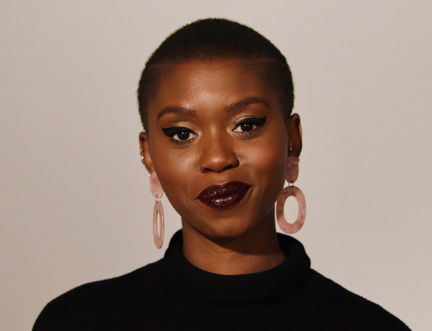More articles Saturday 22 August 2020 1:10pm
Lola Olufemi & Minna Salami: “The core of black feminism is anti-capitalist and anti-imperialist."

“The past few months has us talking about race and gender in ways we haven’t before” said author Minna Salami in a conversation with Lola Olufemi chaired by Jade Bentil at the Edinburgh International Book Festival online this afternoon.
After reading from her book Sensuous Knowledge, Salami continued, “the conversations we’re having at the moment are from black feminist conversations… black feminists have been talking about these intersectional issues for years”.
Salami made the point that decolonisation is tied to everything in these conversations, and though the term itself is becoming a buzzword and “Institutions that are everything but decolonial are using the term ‘decolonisation’”. Ultimately, “Decolonisation has to be something that brings unity and mindfulness to the mind and our politics”.
Lola Olufemi, author of Feminism, Interrupted, agreed that the interconnectedness is crucial especially when it comes to the discourse between food and feminism. “Perhaps everything we’re feeling as individuals about our bodies is connected to the material conditions in which our food is made and produced.” By food production, she specified, “The machinery of exploitation that creates agriculture and the exploitation that’s embedded in that in terms of workers having little to no rights… Those are all connected to the food that we eat and therefore the relationships we have to our bodies.” She questioned, “If we built a world where it would be impossible for our food to be produced under the framework of exploitation, how would that change the way we think about food?”
Olufemi went on to discuss food production inside the home and the inequal division of labour between genders making meals and taking on the housework. “Feminist ideologies that have rooted themselves in wages for housework… to get people to understand that labour is labour, and labour is work and should be recognised and compensated as such.”
Olufemi added that there is a “complicated narrative of healthy eating”. It is tied to privilege whether one can find access to fresh produce or whether one only has access to fast food. “No one has a monopoly of healthy eating. It’s based in fatphobia and the need to be smaller”.
Both Olufemi and Salami agreed that though black feminism was constantly changing, at its core it is anti-capitalist and anti-imperialist. When asked about how all feminists, despite their differences, can come together to be anti-capitalist and anti-imperialist, Salami had this to say, “Feminism is as much a project for sisterhood as it is against patriarchy. For sisterhood it is in a political way... Its fine if we don’t gel with each other, as long as we’re against patriarchy.” She went on, “If feminists are not looking at challenging the global order then they’re not challenging patriarchy.”
Salami continued “Though the core of black feminism is anti-capitalist and anti-imperialist, we can’t forcefully say to black feminist groups in popular culture, like Nicki Minaj or Beyoncé, to stop. They’re doing important work but they’re not anti-capitalist, there needs to be a space for those as well. what I would hope is that that doesn’t get lost. I hope that feminism opens up that space.”
This event was sponsored by the Open University in Scotland. All events at the 2020 Edinburgh International Book Festival Online are free to view through the Book Festival’s website edbookfest.co.uk. The Book Festival continues until Monday 31 August.


 Major new partnership with Celtic Connections
Major new partnership with Celtic Connections 

